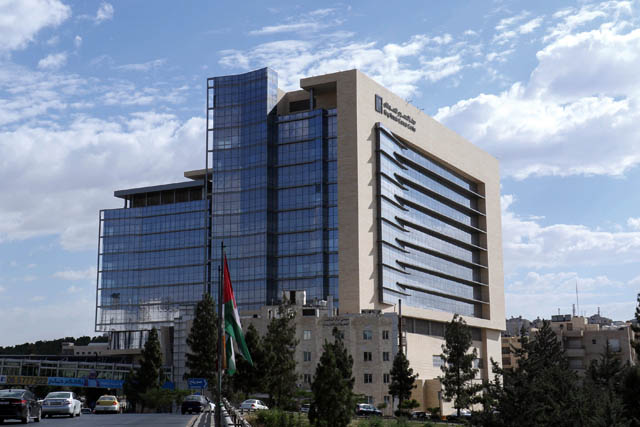AMMAN — With the recent opening of some departments of the King Hussein Cancer Centre’s (KHCC) new expansion, the centre aims to address the rising number of cancer cases and to become a regional training and research hub, the centre’s director general said on Sunday.
Started in 2012 and currently in its “final stages”, the expansion project comprises two main towers; one for inpatient admission and another for outpatient visits, expanded over a total area of nearly 84,000 square metres, the centre’s head, Asem Mansour, explained in an interview with The Jordan Times.
The soft opening of the new project began recently with the opening of a women’s centre on a floor of the outpatient tower, which provides person-centred treatment for female-specific diseases.
In addition, the chemotherapy centre also started operating in the new building three weeks ago, with 200 sessions daily, he said, adding that the new centre provides patients with increased privacy.
Regarding impatient admissions, two pediatric floors are now operating, including general pediatric and intensive care units, the director noted.
In the coming weeks, the centre will start operating on more floors, providing further services such as radiology and operating theatres, he said, noting that 95 per cent of medical equipment and devices are in place and many of them will complete the testing period soon.
Recruitment of staff for each department will also take place shortly before full operation.
“Official inauguration of the whole expansion is scheduled to take place on September 13, under Royal patronage,” Mansour told The Jordan Times.
Capacity
There are some 5,400 new cancer cases recorded each year among Jordanians and an additional 2,500 cases among non-Jordanians, according to the National Cancer Registry.
The current centre has the capacity to treat 2,800 new cases, but the rising number of cancer patients meant the centre treated 3,800 new cases in 2016.
The expansion will allow the treatment of all Jordanian cancer patients, as well as some patients from the region, over the next 10 years, the physician said.
Furthermore, the centre will expand its implementation of technological advancements and new cancer treatment programmes, which require specialist facilities, to allow person-centred care, he added.
Such person-centred care will see patients and their families provided with access to counselling services, as well as a “healing garden” in the centre’s grounds, Mansour explained.
Training and research
As the KHCC seeks to become an oncology training hub in the region, the Khaled Shoman training centre and a training academy will also be part of the expansion, operating in partnership with the University of Jordan and offering new diplomas, masters and short-term training programmes for the KHCC’s staff, as well as practitioners in Jordan and the region.
The training floor will incorporate hands-on training and simulation techniques, Mansour explained.
The new facilities will house the first public umbilical cord blood bank in Jordan, as well as a cell therapy and genomic lab to enrich research efforts and put Jordan on the international oncology research map, he added.
Obstacles
The expansion will address one of the biggest challenges facing the KHCC, which is the pressure on the facility due to the rising number of cancer patients, said the director, highlighting that the centre sometimes has to reject cases as they exceed KHCC’s capacity.
The high competition among medical institutions in the region and the acute shortage of qualified and well-trained staff also contribute to the “brain-drain” issue, which causes KHCC staff who received training at the centre to find better paying opportunities abroad after gaining a few years of experience in Jordan, Mansour noted.
While the centre has been treating patients referred by the government for many years, the government’s delays in paying dues, which directly contribute to the centre’s expenditure, will prompt the centre to diversity its sources of income and to admit Jordanian cash payers and non-Jordanians, the centre’s director said.
The new project will provide a special floor for international patients with all necessary logistic services.
Meanwhile, the centre will “remain loyal” to its underprivileged patients and continue to cover accommodation and transportation fees, through charity funds for those covered by medical insurance who have difficult financial circumstances, he stressed.
The Syrian crisis has also had an impact on the centre, Mansour said, noting that some 400 cancer cases among Syrian refugees have been treated by the centre so far, at a total cost of nearly JD8.5 million. This was funded by a special charity fund supported by some Arab Gulf countries.
Many Syrian patients are still on the waiting list, with expectations of 600-700 new cancer cases every year among Syrian refugees, the director stressed, adding that the rest of the international community did not contribute to the treatment of these refugees.
Another challenge lies in the sharp increase in registered cancer cases, a matter affected by both the natural population growth and practices that cause cancer, such as tobacco consumption.
“If the current trends remain the same in Jordan, I expect neither the new KHCC buildings nor others will be enough to address the needs of cancer patients by 2030,” he said, claiming that Jordan is among the world’s top four countries in tobacco consumption.
Smoking is responsible for 30 per cent of fatal cancer cases, he noted.
Donations
Governmental and non-governmental donations have covered the costs of the JD120 million expansion project, Mansour said.
Over the past 15 years, the centre’s donation funds have collected $50 million (some JD35.5 million) for treating financially challenged patients, including Jordanians without medical insurance or poorly insured citizens.
Donations also cover awareness campaigns and the Jordanian Breast Cancer Programme’s two equipped vans, which raise awareness in remote areas.
The centre’s future plans include further boosting efforts for cancer control to address breast cancer, tobacco consumption and colon cancer, the second most common cancer in Jordan.
